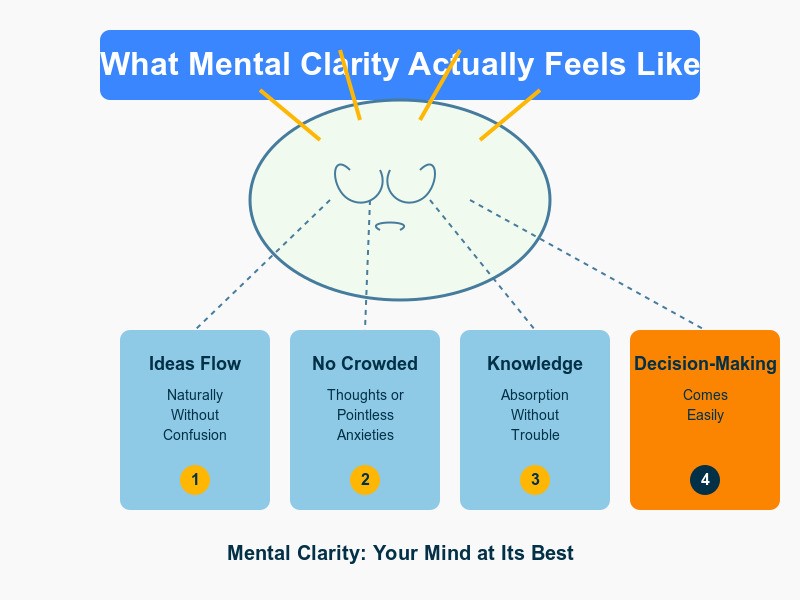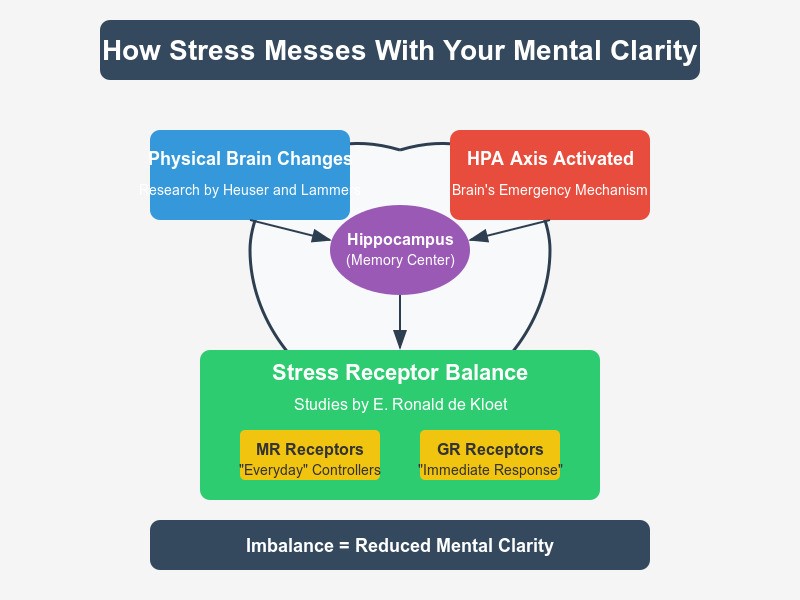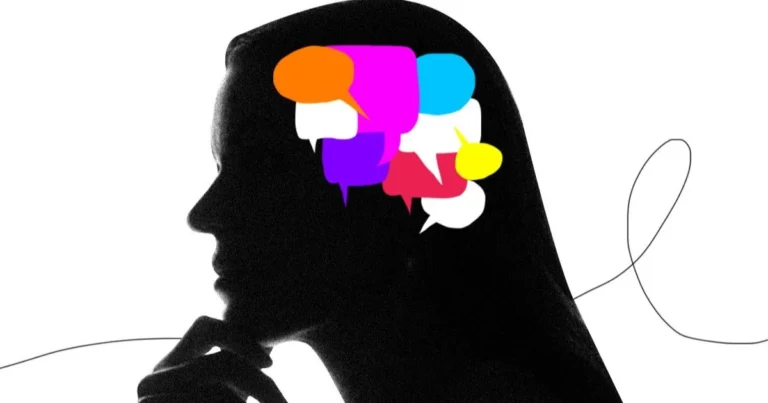Clear thinking isn’t something only experts can do; it’s your secret tool for crushing your day. When your mind is clean, choices come readily, anxieties disappear to the background, and ideas run smoothly.
In fact, simple things, like a 5-minute morning meditation, 4-7-8 breathing, or making quick changes to your surroundings, can help you get clear in minutes. Plus, habits like sleeping every 90 minutes and taking planned breaks to move around every 52 minutes can directly affect how sharp your mind is.
So, when brain fog strikes the next time, think about changing your strategy rather than pushing harder. You can go from being confused to focused, from feeling stressed to in charge, and ready to handle anything that comes your way if you have the right mental tools. To dive deeper into mastering your thoughts and taking control of your life, check out Confusion To Clarity: How To Control Your Thoughts And Take Charge Of Your Life.
What is Mental Clarity and Why Does it Matter?
Mental clarity is the state of clear, targeted, emotionally balanced awareness of your mind. According to Stephen Toulmin, understanding is an important part of being mentally healthy, not just not having a mental illness.

What Mental Clarity Actually Feels Like:
- Your ideas come naturally without confusion.
- Your head isn’t crowded with pointless anxieties.
- You absorb knowledge without any trouble.
- Decision-making comes easily.
Mental Clarity in Real Life
Let’s say it’s Monday morning and you’re facing:
- 27 emails needing answers
- A big project due in two days
- 3 meetings, one after another
- Personal errands you promised to do
Your heart races as you stare at your screen. Everything feels urgent, and your thoughts are all over the place. You’ve been spinning your wheels for an hour with nothing to show for it.
You take a deep breath and decide to pause. You close your laptop, grab a notepad, and spend just 5 minutes sorting out what really matters. As clarity kicks in, you see:
- Only 4 emails need quick answers
- The project only needs 3 key parts done today
- You can move 1 less important meeting
With this new clarity, you tackle the must-do tasks first. By lunch, you’ve answered those 4 important emails, finished 2 of the 3 project parts, and moved the unnecessary meeting. What seemed like a mountain of work has become one of your best days in weeks.
How Does Clarity Relate to Happiness?
Toulmin notes that our overall human experience shapes our mental moods. He writes that “it will never be possible wholly to separate the human tasks involved in the professional handling of those different complaints.”
Your emotions also calm down when your mind does. Fixing the way you think will help your feelings, too, so it’s like getting two apples with one stone.
Mental clarity is more than just a way of thinking, according to Toulmin. It also makes us better people as a whole. When we have mental clarity, we really flourish rather than just handle challenges.
How Does Stress Mess With Your Mental Clarity?
Stress immediately challenges your brain’s capacity for clarity of thought. Research by Heuser and Lammers reveals actual physical changes happening up there, not simply “all in your brain”.

Your brain uses its emergency mechanism, the HPA axis, when stress strikes. This axis makes your body release a lot of stress hormones that affect your brain, especially the memory area called the hippocampus.
- Ronald de Kloet’s studies indicate that your brain regularly balances two different kinds of stress receptors:
- MR receptors: Your “everyday” stress controllers
- GR receptors: Your team for “immediate response”
Your ability to think clearly suffers greatly when they go out of balance due to excessive stress.
What Really Happens Inside Your Brain?
- Your brain physically changes its form: McEwen and his colleagues discovered that long-term stress changes the parts of the brain that help you think clearly.
- Hormone overload: Too much cortisol destroys the brain cells required for logical reasoning and memory.
- Your thinking center loses importance: Your prefrontal lobe, which helps you make decisions and concentrate, gets less blood.
The result? It’s hard to concentrate, think straight, or make good choices. Heuser says that these changes might help for a short time, like when you’re in direct danger, but they make it impossible to think clearly when anxiety lasts for a long time.
7 Practical Steps You Can Take to Increase Mental Clarity
Lets get deeper and deeper to fix those fogy thought:
The 5-Minute Morning Meditation Hack
Just 5 minutes of morning meditation can set you up for a day of crystal-clear thinking. This quick practice wakes up your brain’s focus center while telling your stress alarm to chill out.
How to Do It:
- Sit comfortably with a straight back and set a 5-minute timer
- Breathe normally and pay attention to how the air feels at your nose
- When your mind wanders (totally normal!), just bring your attention back to your breath
- In the last minute, check your body for any tight spots and let them relax
This mini morning routine resets your mental state and can boost your focus for up to 3 hours. What’s even better is that doing it every day for 5 minutes works better than doing it all at once once a week for longer.
Understanding the nonstop conversation in your head — what we call the ‘Roommate’ — is key to clearing mental fog. Based on the insights from Don’t Be A Crab, becoming aware of this inner chatter helps you take control of your thoughts and find calm.
Breathing Tricks That Clear Your Mind Fast
The way you breathe directly controls whether your body feels stressed or calm. The right breathing technique can flip you from panic mode to clear thinking in about 90 seconds flat.
The 4-7-8 Breathing Method:
- Breathe in for 4 counts
- Hold your breath for 7 counts
- Breathe out for 8 counts
- Repeat 4 times
Best times to use it: When you’re feeling overwhelmed, before big conversations, or when anxiety creeps in.
Why it works like magic: That long exhale triggers your body’s relaxation response and cuts down stress hormones on the spot.
For an extra boost, put one hand on your chest and one on your belly; make sure your belly expands more than your chest with each breath.
Little Attention Boosters You Can Easily Do Every Day
When your mind is all over the place, you can kiss mental clarity goodbye. The good news? You can train your brain to focus better with some super simple daily habits that take almost no time.
Try These Quick Mental Clarity Boosters:
- Be a One-Thing Wonder: Pick one everyday activity (maybe eating lunch, taking a shower, or walking to your car) and give it your full, undivided attention
- Do the 5-4-3-2-1 Reset: Three times a day, hit pause and notice 5 things you see, 4 things you feel, 3 things you hear, 2 things you smell, and 1 thing you taste.
- Create No-Phone Zones: Make certain times (like meals or the first/last hour of your day) and places (especially your bedroom) completely tech-free
Ask Better Questions, Get Clearer Thinking
The right questions can cut through mental fog like nothing else. According to research by Ritchie-Dunham and Puente, big companies like Intel, Pfizer, and Royal Dutch/Shell use something called the GRASP method to help their leaders think more clearly; and it really works!
The GRASP Method Breaks Down Like This:
- Goals clarity: Ask yourself, “What exactly am I trying to make happen here?” This forces your brain to get super-specific about what you want.
- Role clarity: Ask “What part is actually mine to play?” This stops the confusion about who should be doing what.
- Activity clarity: Ask, “What specific actions will actually move the needle?” This prevents you from spinning your wheels
- Structure clarity: Ask, “How do all these pieces fit together?” This helps you see the bigger picture
- Procedure clarity: Ask, “What’s the right order of steps?” This creates a logical game plan
These questions work so well because everyone has blind spots in their thinking. The researchers found that executives who used this method were 37% more confident in their decisions and 42% more in sync with their teams.
Hack Your Space for a Sharper Brain
Your surroundings can make or break your thinking clarity. It’s not just fluff; the University of Fallujah research actually proved that your environment directly impacts how well your brain works!
5 Easy Environment Tweaks for Clear Thinking:
- Declutter your space: Take a quick 10-minute “clean sweep” of your desk each morning. Toss the junk, file the papers, and only keep out what you need for today’s tasks.
- Stick to power routines: Pick your 3 most important daily habits and lock them into specific times. Morning workout at 7am, planning session at 8:30am, email check at 10am; No exceptions.
- Draw your work boundaries: Block off “focus hours” in your calendar and make them sacred. Also, turn your phone to airplane mode and close all extra tabs during these times.
- Use dedicated tools: Keep a separate notebook just for big ideas, specific folders for each project, and even different pens for different types of tasks.
- Make your goals impossible to ignore: Write your top goal on a bright sticky note and slap it on your computer monitor, bathroom mirror, and phone case.
Your brain works better when it doesn’t have to remember everything. When your space does some of the thinking for you, your mind gets a major upgrade.
4 Brain Reset Buttons That Actually Work
Your brain can heal itself from stress damage if you give it the right care. Science shows that all those stress changes in your brain can actually be reversed since your brain is basically a self-healing supercomputer!
4 Science-Backed Ways to Restore Your Brain:
- Grab some green time: Take a 20-minute “nature break” during lunch. Even sitting under a single tree in a city park counts!
- Learn one tiny new thing: Pick up your phone and watch a 10-minute tutorial on something you’ve always wanted to learn, whether it’s basic Italian or how to fold origami.
- Move it or lose it: Dance like crazy to three songs while getting ready in the morning. No special clothes or equipment is needed!
- Connect for real: Call (don’t text!) one person you care about during your commute. Just hearing a friendly voice for 5 minutes makes a measurable difference.
Strategic Digital Environment Organization
Digital clutter creates the same cognitive burden as physical clutter but can be even more insidious because it’s less visible. The average person checks their phone 96 times daily—once every 10 minutes—each interruption requiring 23 minutes to regain complete focus.
- Notification Elimination: Perform a complete audit of your phone settings and disable notifications for all apps except calls, messages from 5 key people, and calendar reminders.
- Digital Container System: Create exactly 4 folders on your desktop (Current Projects, Resources, Archive, and Personal) and maintain a strict no-loose-files policy.
- Triple-Filter Email Management: Set up 3 automatic filters for your inbox—urgent, important-not-urgent, and everything else. Them check each category at different frequencies (3x, 1x, and 1x daily respectively).
How Does Your Body Affect Your Brain Power and Reduce Stress?
Your physical health is the backbone of your thinking ability. In a word, your body condition directly impacts how well you can focus, process information, and think clearly.
Fix your physical health first, and your mental clarity will follow!
Sleep Tricks That Supercharge Your Brain
Good sleep is like hitting the reset button on your brain. While you’re in dreamland, your brain is busy clearing out the day’s mental junk and filing away important memories.
- Time your sleep in 90-minute chunks: Plan to sleep for either 7.5 or 9 hours each night. Waking up in the middle of a sleep cycle is like pulling the plug halfway through a download; you’ll feel mentally foggy for up to 2 hours afterward.
- Make your bedroom cool – like really cool: Keep your bedroom between 65-68°F (18-20°C). This sweet spot triggers a drop in your body temperature that puts you into deeper sleep.
- Go vampire-dark at night: Hunt down and eliminate every speck of light in your bedroom – even those tiny blinking lights on your gadgets. Even a small amount of light cuts your sleep hormone and mak your sleep lighter even if you don’t wake up.
Eat Your Way to a Sharper Mind
What goes into your stomach directly affects what happens in your head. The right foods provide brain fuel, build blocks for brain chemicals, and keep brain inflammation in check.
- Hydrate before you caffeinate: Down a big glass of water (about 16oz) first thing in the morning. Your brain loses water while you sleep, and even mild dehydration cuts your thinking ability.
- Eat like a hobbit: Have 3 smaller meals with 2 healthy snacks in between instead of large meals. This keeps your blood sugar steady and prevents those brutal afternoon brain crashes.
- Feed your brain the good stuff: Include 2 omega-3 rich foods every day (like salmon, walnuts, or chia seeds) and eat fruits and veggies in 5 different colors.
Move Your Body to Clear Your Mind
The right kind of movement can snap your brain into focus mode almost instantly. When you move, blood rushes to your brain and releases a cocktail of feel-good chemicals that cut through mental fog like nothing else.
3 Movement Tricks to Jumpstart Your Brain:
- Morning Brain Wake-Up: 5 minutes joint movement + 3 minutes deep breathing + 2 minutes heart-pumping activity.
- 52-Minute Focus Hack: Work for 52 minutes, then do 30 seconds of cross-body movements.
- Green Brain Boost: Take 12-minute walks in nature 3 times weekly.
FAQs
What’s a simple framework for making clear decisions?
Use the 3-2-1 method to cut through the mental noise. First, name 3 core values that matter for this decision. Next, list 2 potential outcomes for each option you’re considering. Finally, pick 1 option that best lines up with your values.
What questions should I ask myself before making important choices?
Ask yourself these two game-changing questions: “Will I even care about this a year from now?” and “Does this choice match up with the person I’m trying to become?” These questions help you filter out decisions based on temporary emotions and keep you connected to your bigger life direction.
How can I reset my clarity in the middle of a busy day?
Try this 2-minute brain reset when your mind gets foggy. Stand up from your desk, look out a window at something far away, take 6 slow deep breaths, and remind yourself of your #1 goal for today.
What should I do before bed to improve mental clarity?
Give yourself a 5-minute evening mental cleanup. Ask yourself; what went right today, what did I learn, and what’s one thing I’ll do differently tomorrow.
What are some emergency tricks for when I feel totally overwhelmed?
Use the 5-5-5 technique to ground yourself fast. Name 5 things you can see right now, take 5 deep breaths (counting each one), and list 5 facts you know for sure about your situation.







